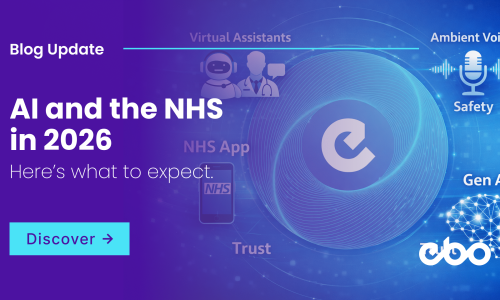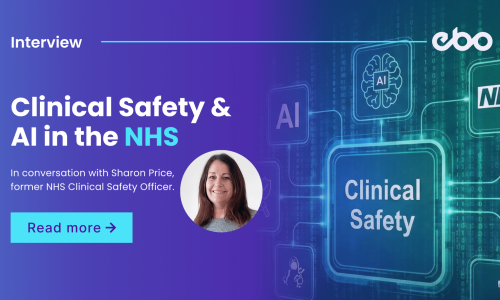What Does the Future Look Like with Agentic AI in Healthcare?
We brought together health and technology leaders to explore exactly that question. Together they unpacked what we mean by Agentic AI in healthcare and how technology in healthcare is evolving beyond traditional automation into a new era of autonomous, adaptive, and empathetic digital solutions. This technology is here and is transforming how patients and clinicians engage with each other and improve patient’s access to care.

The session was hosted by Sharon Price, Clinical Pre-Sales Manager at EBO and featured insights from Spencer Noble (Senior Account Director and UK Healthcare Lead, Teneo AI), Richard Samuel (Healthcare Strategy Director, EBO), and Dr. Gurnak Dosanjh (NHS GP and Deputy Chief Clinical Information Officer, NHS Leicester, Leicestershire and Rutland ICB ).
First off – What is Agentic AI?
The discussion opened with a look at the evolution of AI in healthcare; from simple chatbots and rule-based systems to Agentic AI, which can reason, plan, and act autonomously.
Unlike its predecessors, Agentic AI doesn’t just respond; it understands context, learns from interactions, and proactively takes action.
Richard Samuel described this as a “shift from conversation to collaboration,” where digital agents can anticipate needs, manage workflows, and deliver care more efficiently without human micromanagement.
Reducing Administrative Burden for Clinicians
Dr. Gurnak Dosanjh shared a practitioner’s perspective, highlighting how administrative overload continues to be one of healthcare’s biggest challenges. From appointment scheduling to follow-ups, clinicians spend vast amounts of time on repetitive tasks that could be automated.
He emphasised that Agentic AI offers a real opportunity to return time to clinicians, allowing them to focus on direct patient care rather than bureaucracy. In his view, the value of AI lies not just in efficiency, but in enhancing the quality of human interactions.
“Every week, clinicians spend countless hours chasing forms, following up on appointments, or responding to messages that could easily be automated. If we can free up even a fraction of that time through Agentic AI, it means more direct care for patients and less burnout for staff.”
Personalised and Proactive Patient Engagement
Spencer Noble noted that healthcare systems are moving towards more proactive models of engagement and Agentic AI plays a crucial role in making that possible.
Imagine a digital agent that not only books a patient’s appointment but also checks medication adherence, monitors symptom updates, and provides health education tailored to that individual’s condition.
By connecting with patients in a personalised, empathetic, and context-aware manner, Agentic AI has the potential to strengthen trust and improve long-term health outcomes

The Growing Role of Voice AI in Healthcare
The panel also explored how Voice AI is emerging as a powerful tool within the broader Agentic AI ecosystem. Voice interfaces allow patients, especially those who may struggle with digital literacy or accessibility barriers, to engage with healthcare services naturally, using conversation rather than clicks. From booking appointments and receiving medication reminders to triaging symptoms in real time, Voice AI can make interactions more inclusive and human-centered.
As Spencer Noble noted, this technology “brings care closer to the way people actually communicate,” enabling healthcare providers to extend empathy and efficiency simultaneously.
Building Trust and Ethical AI in Healthcare
A major theme across the panel was trust, both from clinicians and patients. Transparency, governance, and clinical oversight are essential to ensure Agentic AI supports, rather than replaces, human expertise.
According to Richard Samuel, the technology must be “safe, explainable, and accountable.”
Sharon Price also emphasised that successful adoption depends on clear communication about what AI can (and cannot) do, along with robust compliance and ethical frameworks.

The Road Ahead
Agentic AI won’t replace healthcare professionals. It will empower them. By automating routine interactions, delivering proactive care, and offering personalized experiences at scale, it stands to redefine the patient journey and transform healthcare operations.
As Dr. Dosanjh summed up:

